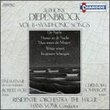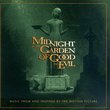| All Artists: Eberhard Wächter, Johannes Brahms, Herbert von Karajan, Berlin Philharmonic Orchestra, Vienna Choral Association, Wiener Singverein, Wolfgang Meyer, Wolfgang Sebastian Meyer, Gundula Janowitz Title: Brahms:Ein Deutsches Requiem, Op.45 Members Wishing: 0 Total Copies: 0 Label: Deutsche Grammophon Release Date: 5/9/1989 Genre: Classical Styles: Opera & Classical Vocal, Historical Periods, Early Music, Modern, 20th, & 21st Century Number of Discs: 1 SwapaCD Credits: 1 UPC: 028942725225 |
Search - Eberhard Wächter, Johannes Brahms, Herbert von Karajan :: Brahms:Ein Deutsches Requiem, Op.45
 | Eberhard Wächter, Johannes Brahms, Herbert von Karajan Brahms:Ein Deutsches Requiem, Op.45 Genre: Classical
|
Larger Image |
CD DetailsSimilar CDs
Similarly Requested CDs
|
CD ReviewsExcellent! better than Gardiner's; powerful, most inspiring 12/27/1999 (4 out of 5 stars) "I give this wonderful recording 4 stars only because I have yet to hear the highly touted Otto Klemperer version. But this is absolutely one of my favorite CD's. I am familiar with Philippe Herreweghe's interpretation as well as the well-regarded John Gardiner version. Both the Klemperer and Gardiner performances are saluted in the 1998 Gramophone Classical Good CD Guide and in various other guides as being definitive recordings of the German Requiem. The Herreweghe version is merely a mention in the 1998 Guide, and deservedly so; the performance and interpretation aren't terrible but are neither worthy of discussion.The Gardiner version is indeed quite good. The 1998 Guide discusses how Brahm's original metronome markings are faster than that of most interpretations. Brahms didn't intend for this requiem to be dreary. Rather the German words often speak of joy: "joy and gladness," "rejoice in the living God," and "your heart shall rejoice." Gardiner's is one of the few recordings to follow Brahms's intended tempo. Gardiner is also lauded for "best recorded sound and the best choral singing; his way with the score is also compelling and powerful." Gardiner's Requiem is definitely passable listening. I don't agree with another Amazon reviewer's observation that his orchestra sounds "scrawny and weak," although I also have issues with the orchestral sound. There are similarities between Gardiner's interpretation and Karajan's.But Karajan's recording is simply much more profound. (While I am most definitely a Brahms fan, I am by no means a Karajan fan and remain largely ignorant of and indifferent to his work, perhaps for reasons given by another reviewer elsewhere at this site.) Karajan has none of Gardiner's occasionally packaged sound. Karajan always sounds real and meaningful. Accurate tempo or not, and period instruments notwithstanding, Gardiner's interpretation has a touch of muzak to it, when compared to Karajan's much more poignant recording. Gardiner's is just a bit too cheerful, insensitive, martial or heavyhanded at times. It can resemble fairly predictable church music sung by a church choir. Karajan's work, while profoundly spiritual, is more secular and Beethoven's 9th-like, because symphony and choir cover the whole range of dynamics and not just part or most of it. Nothing is withheld. From Karajan's much less plodding but softly insistent cello and lower string beats at the start and the dynamic but hushed choir entrance shortly thereafter, to the glorious full choruses later on, Karajan effortlessly draws in and holds his listener with an unmistakable sincerity and richness of feeling that utterly convinces, awes and inspires. The tempo is not noticeably too slow, boring, heavy or tedious. Rather, Karajan conducts with that full, expansive Brahms quality that relaxes the listener into inhaling deep breaths and saying, "Ahhhhhhh," while at other times solidly embracing lighter feeling. The soloists, Janowitz and Waechter are fine. Like Klemperer's, Karajan's is an older performance. However, the remastered CD quality is perfectly acceptable. In the middle of part 6 (Denn wir haben...), the sopranos falter a half-note off in one of the many key changes, but this does not detract greatly from an otherwise most convincing performance, in which all have sung or played their hearts out. As this recording is to this listener's ears superior to Gardiner's much more publicized one, one can only conclude that sometimes the critics miss real quality." Unbelievable !!! Blygman | Paris, France | 03/01/2003 (5 out of 5 stars) "It is the fifth time in a row that I am listening to this piece. I had previously the Gardiner interpretation which left me cold, unmoved. But this interpretation is so tuneful. The Wiener Singverein chor gives me gooseflesh. And when Gundula Janowitch sings, I am in heaven. I am rediscovering this work. What a bliss ! A jewel !!! from beginning to end." A good Brahms REQUIEM, but not the best Alan Majeska | Bad Axe, MI, USA | 12/05/2005 (4 out of 5 stars) "Herbert von Karajan's 1965 recording of Brahms EIN DEUTSCHES REQUIEM is very good indeed, but not the best in my perception. That honor would go to Otto Klemperer's 1961 Philharmonia recording with Dietrich Fischer-Dieskau and Elizabeth Schwarzkopf as soloists (EMI). However, unless you are really fussy about sound - the EMI has better bass frequencies than Karajan's DG - Karajan should be fine.
I used to have this on LP, and bought the CD issue. My only complaint about the sound is that the bass seems weak on the CD, an important component in Brahms. Also, I don't hear the organ in Karajan's recording as much as in others: Klemperer, or Shaw/Atlanta (Telarc). Sometimes Karajan has a mania for slow tempos, which in some cases serves the meaning of Brahms' texts - all from Holy Scripture - but some of his transitions don't seem natural in my perception. The Berlin Philharmonic plays wonderfully and the Vienna Singverein sings beautifully, but somehow the whole experience leaves me less satisfied than Klemperer or Shaw do. This is not a bad recording job; I just have some reservations about the sound. And, Karajan will probably please most listeners; I read this is better than his digital DG recording, also with the Berlin Philharmonic. But I would go with Klemperer (EMI), Shaw (Telarc), or - if you don't mind good 1954 MONO sound - Bruno Walter/New York (Sony, "Bruno Walter edition.")" |

 Track Listings (7) - Disc #1
Track Listings (7) - Disc #1












